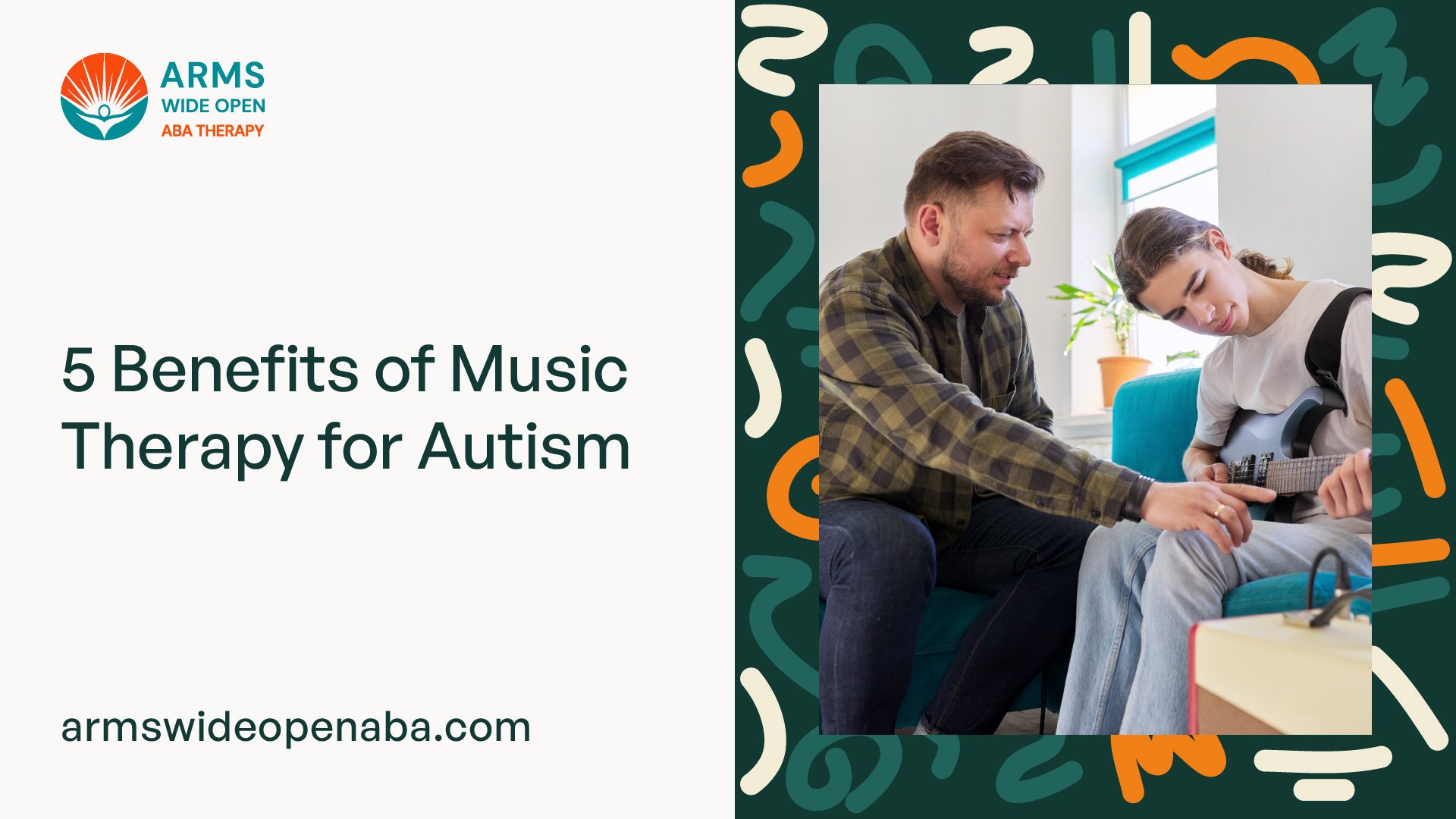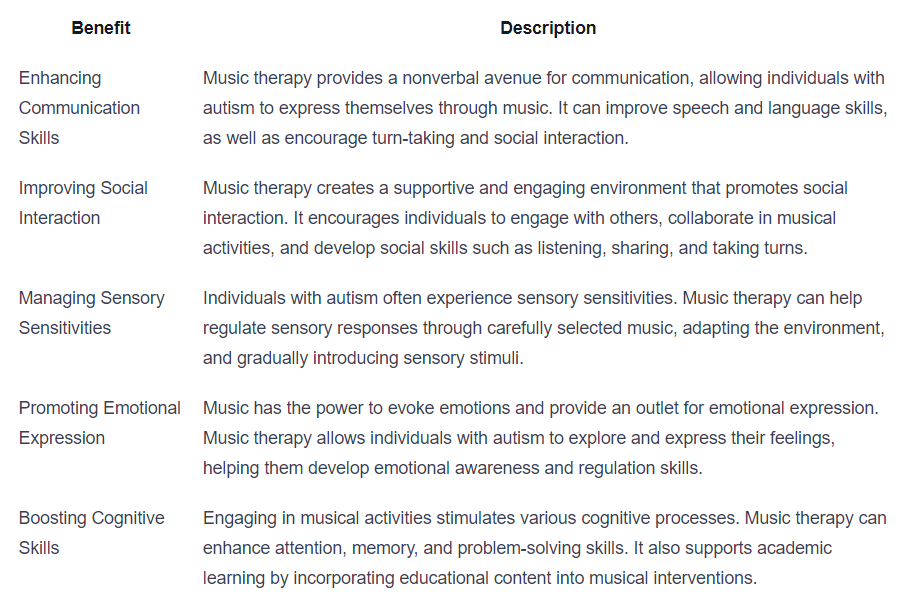5 Benefits of Music Therapy for Autism
Unlock the melodic magic! Discover the 5 powerful benefits of music therapy for autism. Enhancing communication, promoting emotional expression, and more.

Understanding Music Therapy for Autism
When it comes to supporting individuals with autism, music therapy has emerged as a powerful tool. It harnesses the unique power of music to address the specific needs of individuals on the autism spectrum. In this section, we will explore what music therapy is and how it can benefit individuals with autism.
What is Music Therapy?
Music therapy is an evidence-based practice that utilizes music to address the physical, emotional, cognitive, and social needs of individuals. It involves a qualified music therapist who uses musical interventions to achieve therapeutic goals. These interventions can include singing, playing instruments, listening to music, and engaging in movement activities.

The music therapist assesses the strengths and needs of the individual and designs personalized interventions to address specific goals. These goals may vary from improving communication skills to managing sensory sensitivities or promoting emotional expression. Music therapy sessions are structured and tailored to meet the individual's unique needs, ensuring a holistic approach to therapy.
How Music Therapy Helps Individuals with Autism
Music therapy offers a range of benefits for individuals with autism, addressing various challenges they may face. Here are five powerful benefits of music therapy for individuals on the autism spectrum:

By harnessing the therapeutic benefits of music, music therapy provides a unique and effective approach to supporting individuals with autism. It offers a safe and creative space for individuals to engage, communicate, and express themselves, fostering growth and development across various domains.
Benefits of Music Therapy for Autism
Music therapy has shown to be a powerful intervention for individuals with autism, providing a range of benefits that positively impact their overall well-being. Let's explore five key benefits of music therapy for individuals with autism.
Enhancing Communication Skills
Communication can be challenging for individuals with autism, but music therapy can help bridge the gap. Through music, therapists can engage individuals with autism in various ways, such as singing, playing instruments, or using music as a tool for verbal expression. This can lead to improvements in speech, language development, and overall communication skills.
Improving Social Interaction
Social interaction can be difficult for individuals with autism, but music therapy can create a conducive environment for social engagement. Group music activities, such as singing together or playing instruments in an ensemble, can encourage individuals with autism to interact and connect with others. This fosters social skills, turn-taking, and cooperation, leading to improved social interaction and relationships.
Managing Sensory Sensitivities
Individuals with autism often experience sensory sensitivities, where certain sounds or environments can be overwhelming. Music therapy can help manage these sensitivities by providing a controlled and structured auditory experience. Therapists can tailor music sessions to meet the specific sensory needs of each individual, helping them gradually desensitize and cope with sensory challenges.
Promoting Emotional Expression
Emotional expression can be challenging for individuals with autism, but music therapy offers a powerful outlet for self-expression. Through music, individuals can express their emotions, thoughts, and experiences in a non-verbal and creative way. This can lead to increased emotional awareness, regulation, and overall well-being.
Boosting Cognitive Skills
Music therapy has also been found to have a positive impact on cognitive skills for individuals with autism. Engaging in musical activities can stimulate various areas of the brain, enhancing cognitive functions such as attention, memory, problem-solving, and executive functioning. It can also support academic skills, such as numeracy and literacy, through the use of music-based learning strategies.
The benefits of music therapy for individuals with autism extend beyond these five areas, with each person experiencing unique improvements based on their individual needs and goals. Music therapy's holistic approach and the inherent power of music can truly unlock the melodic magic and make a meaningful difference in the lives of individuals with autism.
Incorporating Music Therapy into Daily Life
To fully harness the benefits of music therapy for individuals with autism, it is important to incorporate it into their daily lives. This can be achieved through working with certified music therapists and creating personalized music therapy programs.
Working with Certified Music Therapists
When considering music therapy for individuals with autism, it is recommended to seek the expertise of certified music therapists. These professionals have specialized training in using music as a therapeutic tool to address the specific needs of individuals with autism. Working with a certified music therapist ensures that the therapy sessions are tailored to the individual's unique strengths, challenges, and goals.
Music therapists conduct assessments to determine the specific areas of focus and develop appropriate interventions. They have a deep understanding of how music can be used to enhance communication, improve social skills, manage sensory sensitivities, promote emotional expression, and boost cognitive skills in individuals with autism.
Certified music therapists also collaborate with other healthcare professionals, educators, and families to create a holistic approach to treatment. They can provide guidance and support in implementing music therapy strategies at home, school, or other environments, allowing for a comprehensive and consistent therapeutic experience.
Creating Personalized Music Therapy Programs
Personalized music therapy programs are designed to meet the unique needs and preferences of individuals with autism. These programs are developed collaboratively by certified music therapists, individuals with autism, and their families. The goal is to create a therapeutic plan that aligns with the individual's interests, abilities, and therapeutic goals.
The personalized music therapy program may include a variety of musical activities, such as singing, instrumental play, music listening, and movement. These activities can be adapted based on the individual's sensory sensitivities, communication abilities, and motor skills. The program may also incorporate specific goals, such as improving speech and language skills, enhancing social interaction, managing anxiety, or developing fine motor skills.
Regular evaluation and feedback from the certified music therapist are essential to monitor progress and make necessary adjustments to the program. The personalized nature of the program ensures that the therapy remains engaging and meaningful for the individual, increasing the likelihood of sustained participation and progress.
Incorporating music therapy into daily life requires a collaborative effort between certified music therapists, individuals with autism, and their families. By working together, they can create a supportive and enriching environment that maximizes the benefits of music therapy for individuals with autism.
Music Therapy Techniques for Autism
Music therapy offers a variety of techniques that can be tailored to the unique needs of individuals with autism. These techniques are designed to engage individuals in meaningful musical experiences while addressing specific goals and challenges. Here are three commonly used music therapy techniques for autism:
Singing and Vocalization
Singing and vocalization are powerful tools used in music therapy to enhance communication skills in individuals with autism. Through singing, individuals can improve their speech production, language skills, and overall vocal control. Music therapists often use songs with repetitive lyrics and simple melodies to encourage participation and engagement.
Table: Benefits of Singing and Vocalization in Music Therapy
Benefits
Improves speech production
Enhances language skills
Develops vocal control
Encourages participation and engagement
Instrumental Play
Instrumental play is another effective technique used in music therapy for individuals with autism. It involves using various musical instruments to facilitate self-expression, creativity, and sensory exploration. Music therapists often introduce different instruments and encourage individuals to experiment with sounds, rhythms, and melodies. This technique can help individuals develop fine motor skills, sensory integration, and emotional expression.
Table: Benefits of Instrumental Play in Music Therapy
Benefits
Facilitates self-expression
Enhances creativity
Supports sensory exploration
Develops fine motor skills
Music Listening and Movement
Music listening and movement are integral components of music therapy for individuals with autism. Listening to music can have a profound impact on mood, attention, and emotional regulation. Music therapists select appropriate music that resonates with individuals and encourages movement. Through rhythmic movements, individuals can improve coordination, body awareness, and motor planning. This technique also provides opportunities for social interaction and engagement.
Table: Benefits of Music Listening and Movement in Music Therapy
Benefits
Improves mood and emotional regulation
Enhances attention and focus
Develops coordination and motor planning
Encourages social interaction
These music therapy techniques are just a few examples of the wide range of interventions available to individuals with autism. The effectiveness of music therapy lies in its ability to tap into the innate connection between music and the brain, providing a therapeutic platform for individuals to express themselves, communicate, and grow.
Success Stories
Music therapy has proven to be a powerful intervention for individuals with autism, unlocking their melodic magic and fostering positive changes in their lives. Let's explore some real-life examples of how music therapy has impacted individuals with autism, along with testimonials from families and therapists who have witnessed its transformative effects.
Real-life Examples of Music Therapy Impacting Individuals with Autism
- Case Study: Ethan
- Ethan, a 7-year-old boy with autism, struggled with communication and social interaction. Through music therapy sessions, he began to show remarkable progress. Ethan started using simple words and phrases to communicate his needs and preferences, and he also became more comfortable engaging in social interactions. Music provided a medium through which he could express himself and connect with others in a meaningful way.
- Case Study: Sophia
- Sophia, a teenager with autism, experienced sensory sensitivities that often overwhelmed her. Music therapy helped her manage these sensitivities by introducing calming and soothing rhythms. Through music listening and movement activities, Sophia learned to regulate her sensory responses and find comfort in the melodic sounds. This newfound ability to cope with sensory challenges greatly improved her overall well-being and quality of life.
Testimonials from Families and Therapists
- Parent Testimonial:
- "Since starting music therapy, we have seen incredible growth in our son's communication skills. He used to struggle to express his thoughts and emotions, but now he sings and uses musical cues to communicate. It's truly a remarkable transformation that has brought so much joy to our family." - Sarah, Parent
- Therapist Testimonial:
- "Music therapy has been an invaluable tool in my work with individuals with autism. I have witnessed firsthand how music can break through barriers and create connections. It's amazing to see the smiles on their faces as they engage in musical activities and experience the joy and sense of accomplishment that music brings." - Emily, Music Therapist
These success stories and testimonials highlight the significant impact of music therapy on individuals with autism. Through music, individuals are able to enhance their communication skills, improve social interaction, manage sensory sensitivities, express emotions, and boost cognitive skills. These positive outcomes inspire hope and encourage further exploration of the melodic magic that music therapy offers.
Sources
https://www.autismparentingmagazine.com/autism-child-music-therapy/
https://www.choosingtherapy.com/music-therapy-for-autism/
http://www.musictherapy.org/assets/1/7/MT_Autism_2012.pdf
Similar articles
We’re here to help you

Our team is here to assist you in this process. Contact us for any assistance.
it’s easy to apply
We Accept Most Insurances
Our in-network insurance partnerships make ABA therapy more accessible to families throughout our service areas.







Our Insurance Process
We'll request your insurance details to help us verify your plan's coverage for ABA therapy. Once we've received this information, we'll walk you through your benefits, including copayments, deductibles and out-of-pocket maximums, so you know what to expect in advance.
Our team will then handle the preauthorization and all the necessary paperwork.
.svg)





















.jpeg)


































.jpeg)




.jpeg)







.jpeg)











.jpeg)
















